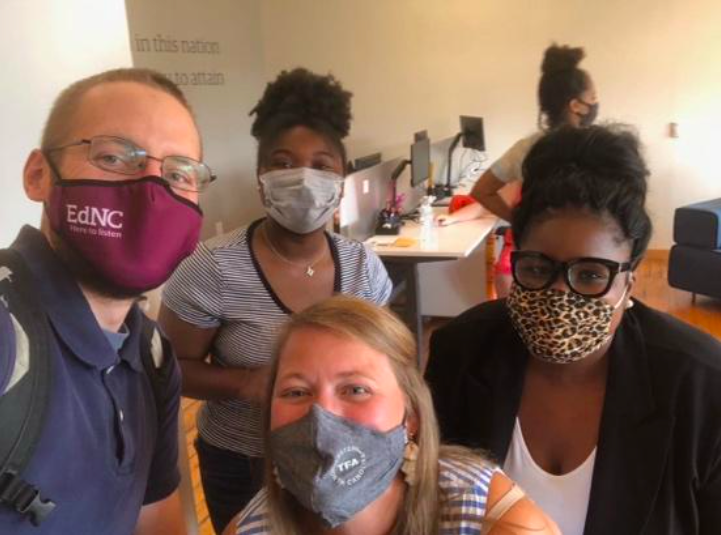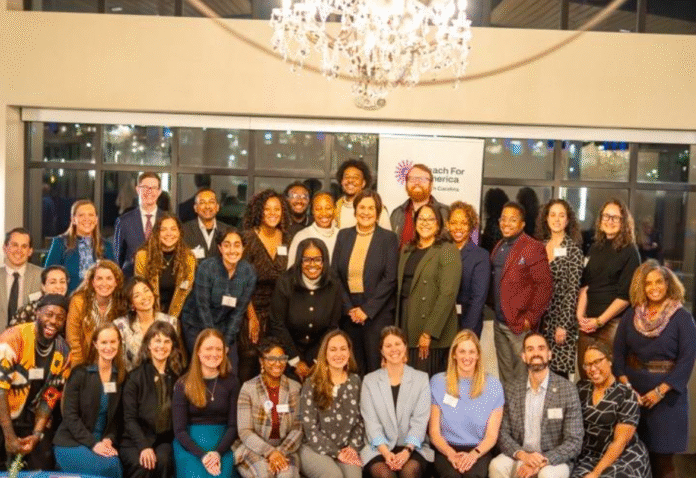As I prepare to end my tenure at Teach For America North Carolina this month, I find myself reflecting on a journey that, while only four years in time, feels like it spanned several distinct eras.
In 2021, I stepped into the role of Executive Director with a bold and urgent mission — to unify three long-standing regional teams into one statewide organization and help guide our community through the aftermath of COVID-19. At the time, EdNC was curious about what this would look like from a leadership lens, and my first reflection on this was published as a Perspective during my first 90 days. At the time, I knew my charge wasn’t just about consolidation or safety protocols — it was about vision, rebuilding trust, and courageous, values-based leadership.
Now, four years later, I understand that unification is never just about structure. It’s about people. It’s about purpose. And it’s about leading with clarity through complexity. As I close this chapter, I thought it would be appropriate to bookend the leadership reflection from my start as I am ending my tenure with lessons that have shaped my leadership and guided our collective progress.
Vision is critical — but trust is everything
Transformational change doesn’t begin with a strategy document — it begins with listening. When I stepped into this role amid the second wave of COVID-19, I was charged with uniting three distinct regions into one statewide model while steering the organization through crisis. That required more than plans and protocols. It demanded trust, clarity, and courage.
Trust, I’ve learned, is not a one-time achievement. It’s built moment by moment —especially in challenge. While I took time to listen and learn, I also had to lean into my experience and make decisions that were sometimes tough, sometimes misunderstood, but always rooted in the mission. Building with a new team, I knew trust would take time — but I also knew I could accelerate it through consistent communication, transparent decision-making, and a deep commitment to doing what I said I would do. That candor — delivered with care — became the bedrock of how we worked together.

Culture doesn’t inherit itself — it must be cultivated
While the decision to unify the regions preceded my hire, the responsibility to make it real was mine to carry. Each region had its own rhythm, history, and identity — and my charge was never to erase those legacies for the sake of efficiency. Instead, it was to honor them and weave them into something new.
That process wasn’t always easy. For some, unification meant excitement and fresh opportunity. For others, it meant grieving the loss of longstanding teams and familiar structures. We navigated that complexity by centering collaboration, inclusiveness, and the strengths each market brought to the table. We understood that a strong internal culture is the first promise we make to the communities we serve. That belief carried us — and ultimately led to some of the highest staff culture scores on record. A winding road, no doubt, but one that brought us together.
Progress isn’t always fast — but it must be sustainable
It’s easy to be drawn to urgency, but real, lasting change requires patience and precision. We made a conscious choice to prioritize deliberate execution over quick wins — aligning systems, strengthening partnerships, and building a resilient foundation that would outlast any single moment or leader.
That commitment helped us rebound our educator recruitment efforts from COVID-era lows, welcoming new corps members from across the country who are now serving students across North Carolina — and still working hard to bring in more. It also fueled the exponential growth of our alumni support efforts and the launch of our high-impact tutoring fellowship, Ignite, in Eastern NC.
As we talk about sustainability, one conversation must remain front and center: Compensation. I hope to see faster progress in our state toward sustainable wages for educators and education leaders. The future of our field — and our ability to attract top talent — depends on it. And yes, I’m biased. I want the very best educators and leaders serving students in the Old North State.
Legacy-minded leadership brings clarity
At every stage of this work, I kept returning to a single question: What legacy are we leaving for those who come after us? That question became my compass — helping me lead not just for the present, but for the educators, students, and communities who will inherit what we build.
Legacy-minded leadership meant making decisions that prioritized long-term strength over short-term ease. It meant investing in the systems and partnerships that would support our people beyond today. We deepened statewide collaboration to retain and elevate our alumni educators and leaders, creating a broader ecosystem of impact that will serve North Carolina for years to come.
These efforts weren’t about headlines or a single year of progress. They were about laying bricks for a more resilient, more enduring future — one that others can build on with confidence.
Relationships are the real infrastructure
No matter the program, policy, or initiative, one truth has remained constant: Relationships are the foundation of everything. Authentic partnerships — with organizations, principals, teachers, board members, donors, students, and staff — have fueled every milestone and moment of progress. The time spent nurturing these connections wasn’t ancillary to the work — it was the work. And it made all the difference.
On a personal note, the relationships that anchored me when I stepped into this role — and sustained me through each chapter — were just as vital. They helped me preserve my own infrastructure as a leader and a person. For that, I am deeply grateful.
It’s from that place of gratitude and growth that I now look ahead. This reflection on my journey reflects the lessons gleaned from the milestones we’ve achieved together and the bright, promising future ahead for Teach For America North Carolina. As I step into my new role as CEO of Road to Hire, I carry with me the hard-earned lessons from TFA — lessons rooted in trust, culture-building, and transformational leadership. With deep roots in business, education, and workforce development, I remain committed to serving the same communities and championing the same students who have always been at the heart of my work. I’m honored to continue this mission from a new vantage point and will be cheering loudly for TFA NC as it enters its next chapter of impact.





